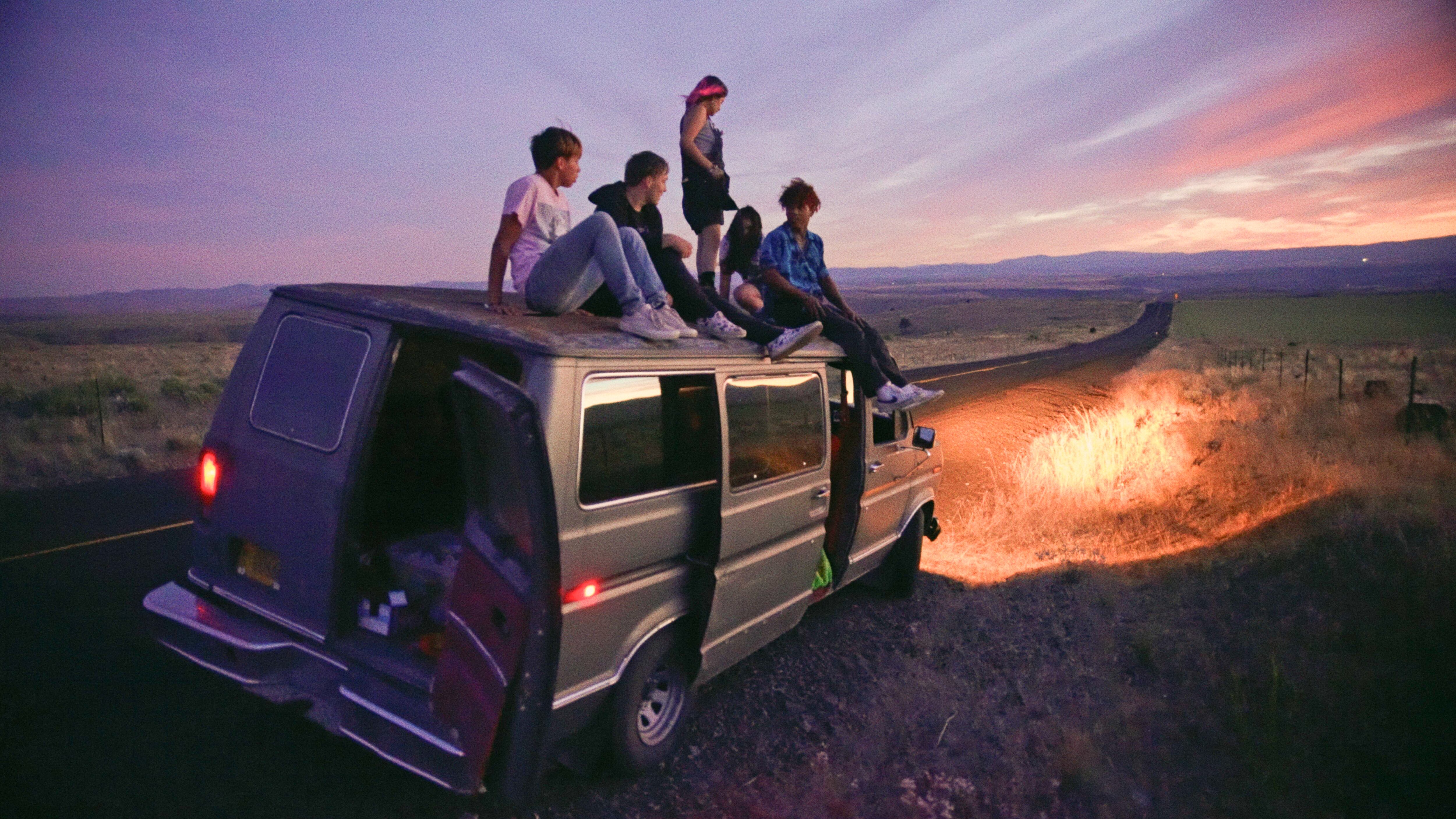There’s no drug like the ignorance of youth, feeling invincible as you navigate a minefield of life-or-death scenarios. If heartfelt, gritty coming-of-age films are your drug of choice, Bill and Turner Ross are your new favorite dealers.
Explore any work in the Ross Brothers’ documentary-heavy filmography and you’ll quickly uncover the duo’s favorite subject: the unvarnished beauty hiding in the pockets of 21st-century Americana stories. Their freshman feature 45365 explores the conformity of small-town America in their hometown, Sidney, Ohio. Tchoupitoulas follows three teen brothers along a late-night adventure in New Orleans, and Bloody Nose, Empty Pockets laments the final moments of a Las Vegas dive bar. Their latest film, Gasoline Rainbow, is their first fiction film, but you’d be forgiven for mistaking it as a documentary.
The semi-scripted movie follows a group of rebellious freshly graduated high schoolers who embark on a spontaneous road trip, driving across Oregon to the coast. With light leaks and hand-held shots, and filmed around Portland and Astoria, the Ross Brothers capture a slice of life, following in the footsteps of La Nouvelle Vague and the principles of cinéma vérité.
The Ross Brothers had mulled over the idea of a story about the blunder years for, well, years.
“It’s the longest creative conversation we’ve had,” Turner tells WW. “It’s the accumulation of our stories from growing up.”
In the tale as old as four years ago, it wasn’t until the COVID-19 pandemic lockdowns that the brothers began to drill down into the specifics of the story.
Gasoline Rainbow’s ensemble cast of amateur actors lends to the film’s authenticity—and finding those rebellious zoomers in the midst of the pandemic was easier said than done. “We hired two of our buddies, and they went for like three months to skate parks and coffee shops and stuff like that,” Turner says. “I hadn’t thought about this, but it also meant that the kids they were meeting with were probably kids that would break the rules.”
The real-life experiences of the kids behind the characters helped shape the story with improvisational-heavy dialogue. “My balls feel like they’re in Satan’s toaster oven,” Tony Abuerto (the actors’ real names are also their characters’ names) quips as the group wakes up in a field the morning after a bonfire party.
“I may be hot as fuck, but it’s never too fucking hot to do a bowl,” Nichole Dukes quickly responds as she pulls a grinder, piece and lighter from her bag.
In between the moments of good old-fashioned teenage fun, the characters slip into profound and meaningful discussions. “That grief you feel when you leave your family is the same thing that holds you back,” says an unnamed fellow hitchhiker who helps the teens learn how to train surf.
“Some of the shit that would come out of the kids’ mouths was, like, something I never could have written or dreamed up,” Bill says.
It’s worth noting that the Ross brothers wear a dizzying number of hats behind the scenes. The writer/director/cinematographer/editor combo title puts most auteur filmmakers to shame. However, despite their many roles, the pair is more than comfortable—even excited—to collaborate with everyone, from extras to executive producers, to carve out a genuine and meaningful slice of life.
“As a philosophy and as a production, we’re creating the parameter and have an intention,” Turner notes. “But within that, all participants become the authors of their own experience.”
“We don’t really want to know what’s going to happen each day,” Bill adds.
The controlled chaos at the center of Gasoline Rainbow is the eye of the storm. Despite the shady characters they encounter along their road trip, the teens always come out the other side of things unscathed and armed with a great new story to tell at the bars they sneak into. Gasoline Rainbow embraces the iconography of the road trip genre without relying on the tropes.
“We didn’t want it to seem too absurd,” Turner says. “It is a magical tale. They somehow keep moving along at every turn, but a lot of times the scenes ended with some exchange-and-barter system of care to lead them to the next event, rather than the traditional punchline.”
From picking up hitchhikers in the dead of night to train surfing with strangers, it’s a story that can only be told in recollection by a now-older narrator with a more developed frontal lobe.
“It was definitely a story being told after the fact, as a memory,” Bill says. “If you analyze it, it doesn’t quite add up.”
“Also, the looseness with which you go about that stage of your life and a road trip—it doesn’t always follow a neat narrative,” Turner adds. “We wanted it to be messy and just as they were wandering through the world.”
SEE IT: Gasoline Rainbow, not rated, screens at Living Room Theaters, 341 SW 10th Ave., 971-222-2010, livingroomtheaters.com. Various showtimes Friday, May 17. $11.75.
